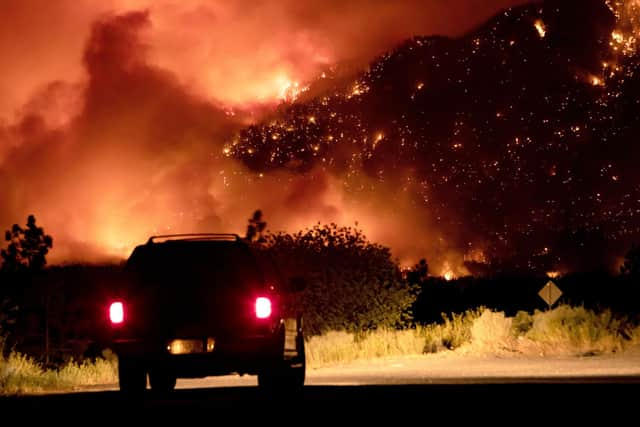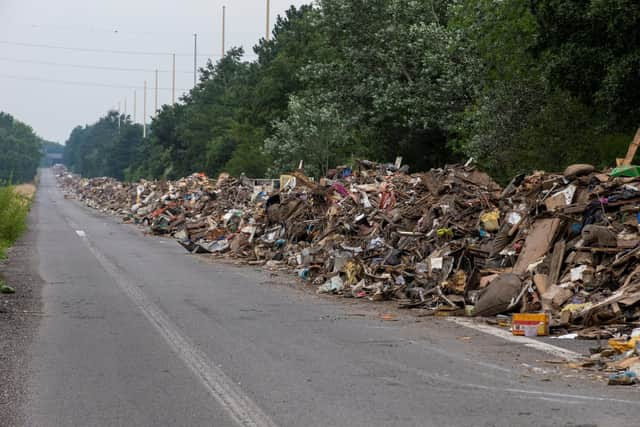Climate change: Will extreme weather events galvanise Cop26 summit action? Don't count on it – Martyn McLaughlin
Across nearly every continent, from developing countries to modern cityscapes, our planet is being subjected to a series of brutal stress tests. What was once perceived as a future threat is very much a present reality.
Consider the breathless international news cycle in recent weeks, where a succession of extreme weather events has attracted considerable coverage, though mostly in isolation.
Advertisement
Hide AdAdvertisement
Hide AdIn western Canada temperatures reached a barely conceivable 49.6 Celsius, triggering a spike in sudden deaths and firestorms capable of generating their own lightning.
In the tundra of Siberia, one of the coldest places on the planet, thousands of firefighters have strived to bring hundreds of wildfires under control. Already, the blazes have torn through around two-and-a-half million acres of forest.
In the communities which surround the Rhine and Meuse river basins, where three months worth of rain fell in 48 hours, people are still sifting through the debris of the devastating floods which have left at least 180 people dead.
In China, a record deluge of rainfall caused havoc, flooding underground railway tunnels and leaving passengers on the Zhengzhou metro system stranded and struggling to breathe, as the water level rose above their chests.
These phenomena are not new. Extreme weather events predate the age of industrialisation, and climate change is not the only driver behind them. But the speed at which they are occurring makes a mockery of those who insist on describing them as once-in-a-century, or even once-in-a-millennium flashpoints.


Perhaps they once were. But no longer. There is an overwhelming scientific consensus that the climate crisis will worsen their frequency, intensity, and impact. With the planet continuing to heat up due to greenhouse gas emissions, the only realistic choice we now face is how grave we allow the situation to become.
Even though we have been warned for years – decades, even – about these kinds of concurrent dystopian weather crises, their regularity has taken even veteran climate scientists by surprise.
As Michael Mann, a professor of atmospheric science at Pennsylvania State University, explained this week: “The warming of the planet is pretty much proceeding as predicted. What's happening, though, is that some of the impacts are playing out faster than we expected.”


Advertisement
Hide AdAdvertisement
Hide AdThe underestimated rate at which such violent weather incidents are happening, Mann said, is because the existing models are imperfect, and cannot fully take into account the impact of collapsing ice sheets, a process which is key to rises in sea levels.
The sum total of all this, you might think, would amount to some kind of wake-up call. Regrettably, with just a few months to go before the crucial Cop26 summit takes place in Glasgow, it looks like the international community’s inaction is as stubborn as ever.
On Monday, a gathering in London saw the first in-person meeting of climate ministers in 18 months due to the coronavirus pandemic. It concluded with all countries agreeing to limit global heating to 1.5C, but they failed to reach a consensus on phasing out the use of coal. The former without the latter is as good as useless.
The UK government described it as a “step forward towards a successful Cop26”. The reality is that we are no nearer to making the kind of radical, transformative change required to meet the greatest challenge our species has ever faced.
We are still on track for a rise in global temperatures of 3C by the end of this century, and a succession of long-term promises are not being matched with short-term action. It will require an unprecedented multilateral push to ensure that every nation can wean itself off fossil fuels, but in the year when it is hosting Cop26, the UK government is hardly setting a sterling example.
It has made a series of historic promises which have won plaudits, yet time and again, it has failed to put in place the strategic framework with which to fulfil them.
In its progress report last month, the UK Climate Change Committee’s Baroness Brown noted that the country was leading the way in terms of diagnosis, but lagging behind in policy and action. “This cannot be put off further,” she warned “We cannot deliver net zero without serious action on adaptation. We need action now.”
An appropriate response to this kind of damning assessment would be humility and a renewed effort to ensure that climate pledges are not mere rhetoric. There is a rapidly shrinking window of time in which to put that right, but the signs are not promising, as evidenced by the Prime Minister’s Cop26 spokeswoman advising the nation not to rinse its plates before popping them in the dishwasher.
Advertisement
Hide AdAdvertisement
Hide AdIn the meantime, the world is being battered left, right, and centre. It may yet be the case that the events of recent weeks will prove to be a galvanising force, but I am sceptical. The same could have been said about the devastating heatwave which killed tens of thousands of people across Europe in 2003.
Back then, politicians warned the world could ill afford to wait to take decisive action. Nearly two decades on, the same empty refrains continue to ring out. I wonder whether those giving voice to them are deep in denial, or merely delirious from the heat.
A message from the editor:
Thank you for reading this article. We're more reliant on your support than ever as the shift in consumer habits brought about by coronavirus impacts our advertisers. If you haven't already, please consider supporting our trusted, fact-checked journalism by taking out a digital subscription.
Comments
Want to join the conversation? Please or to comment on this article.
